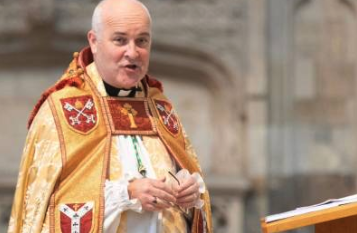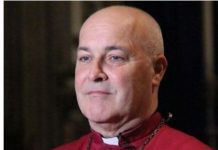The Archbishop of York Stephen Cottrell is facing calls to resign over his handling of a sexual abuse case, days before he takes temporary charge of the Church of England.
As Bishop of Chelmsford, Mr Cottrell let priest David Tudor remain in post in the diocese despite knowing he had been barred by the Church from being alone with children and had paid compensation to a sexual abuse victim, a BBC investigation reveals.
Tudor was only banned from ministry two months ago – after he admitted historical sex abuse allegations relating to two girls.
Since this article was first published, Mr Cottrell has responded saying he is “deeply sorry” that action could not be taken earlier, but that was the situation he inherited.
However, the Bishop of Newcastle the Rt Rev Helen-Ann Hartley has said Mr Cottrell could have done more and should resign as archbishop.
“It completely undermines his credibility that this case was not acted on,” she told BBC File on 4 Investigates.
“How can you have the moral and ethical authority to lead an institution with that?”
A woman who was paid £10,000 compensation by Tudor over claims he sexually abused her as a child says Mr Cottrell’s failure to act when he was told about the payment means he should “leave the Church”.
“I feel like he [Stephen Cottrell] has spat in my face,” says Jessica (not her real name).
The calls for Archbishop Cottrell to resign come at a time of turmoil in the Church of England following a damning report into how it covered up prolific abuse by the barrister John Smyth.
The report led to the resignation of the Church’s most senior figure, Archbishop of Canterbury Justin Welby. Mr Cottrell will take over his role temporarily for a few months in the New Year.
The BBC can reveal that Mr Welby and a former Archbishop of Canterbury, George Carey, were also involved in the Tudor case – Mr Welby in 2018 and Lord Carey in 1993.
David Tudor did not respond to the BBC’s questions.
At least seven women say they were abused by Tudor. One received six-figure compensation from the Church in 2019.
David McClenaghan, a partner at Bolt Burdon Kemp solicitors who brought the claim on behalf of the woman and who has supported other survivors of clerical abuse says “one of the most surprising aspects of this case was that they suspended him on full pay and over a period of time, funded his accommodation and lifestyle.”
Tudor worked for the Church of England for over 46 years, in London, Surrey and Essex, rising from curate to honorary canon. He gained a reputation for filling churches with his charismatic preaching.
He was an area dean on Canvey Island in Essex in 2010, when Stephen Cottrell became Bishop of Chelmsford – a position Mr Cottrell held for 10 years before becoming Archbishop of York.
During his first week in office, Mr Cottrell was fully briefed on the “longstanding safeguarding concerns” raised about Tudor, a spokesperson for the Archbishop said.
Mr Cottrell would have been told:
- In 1988, David Tudor was a defendant in two criminal trials
- In the first trial, he was acquitted of indecently assaulting a 15-year-old school girl although he admitted having sex with her when she was 16
- In the second trial, he was convicted of indecently assaulting three girls and was jailed for six months. The conviction was quashed on technical grounds because the judge had misdirected the jury
- In 1989, Tudor was banned for sexual misconduct by a Church tribunal but was allowed to return to ministry after 5 years
- In 2005, Tudor was suspended as police investigated an allegation he had indecently assaulted a child in the 1970s. He was not charged and was allowed back to work under conditions
- From January 2008, Tudor had been working under a safeguarding agreement preventing him from being alone with children or entering schools in Essex – and yet months later he had become an area dean in charge of 12 parishes
Mr Cottrell’s office told the BBC that for much of his time as Bishop of Chelmsford he had been unable to take any disciplinary action because there were no complaints that hadn’t already been dealt with.
It was not until 2019, when a fresh complaint was made against Tudor leading to a suspension, that there was “an opportunity to remove the risk”, said a spokesperson.
Bishop Hartley, told File on 4 Investigates that had not been an adequate response because “any action that could have been taken” by Mr Cottrell “should have been vastly stronger than simply to try and manage a risk, particularly if the priest in question is already banned from working with children or entering schools”.
In a statement issued on Monday, Mr Cottrell says in 2019 he had “acted immediately” suspending David Tudor from all ministry pending the subsequent tribunal in which he was prohibited from ministry for life.
While Mr Cottrell’s office maintains there were no legal grounds to act until 2019, the BBC can reveal that Mr Cottrell was told in 2012 about the £10,000 payout Tudor had made to Jessica, who says she was sexually abused by him, sometimes very violently, from the age of 11 during the 1970s when Tudor was training to be a minister.
She had brought the claim after police ended an investigation without pressing charges.
“Nobody would make a payment if they haven’t got something to hide,” says Jessica.
Bishop Hartley says the payout was “completely against the principles of the institution” that Mr Cottrell is supposed to be part of and should have led to disciplinary proceedings against the priest.
The personal payment made by Tudor “admitted no liability” – Mr Cottrell’s office told the BBC – adding that the then-Bishop of Chelmsford had been guided by “legal advice” that no further action could be taken.
To compound the hurt felt by those who say they were abused as children by Tudor, three years after making his compensation payment, Tudor became an honorary canon of Chelmsford Cathedral.
Such an appointment was “just horrendous” says Jessica.
David Tudor’s elevation to honorary canon is something Stephen Cottrell “regrets”, says his office, but it was “not a promotion and not a personal reward”.
“It happened because of a change in Church policy during the bishop’s time in office, meaning area deans were automatically made honorary canons.”
But that is “ludicrous” says Bishop of Newcastle Helen-Ann Hartley and “simply not good enough”.
“You are absolutely uplifting somebody’s ministry as an example and a model of good and best practice, and you’re celebrating that actually by making them an honorary canon.”
In his statement after this article was first published, Mr Cottrell said it was “extremely disappointing” that it was being reported “as if it was an abuser being ignored or even protected”.
“Actually, nothing could be further from the truth,” he said.
The Church’s deputy lead bishop for safeguarding, the Bishop of Birkenhead Rt Rev Julie Conalty, says she is “baffled” as to how David Tudor ended up as a licensed priest in the Diocese of Chelmsford.
She told BBC Radio 4’s World at One that Stephen Cottrell did “absolutely the right thing” by suspending him in 2019 – but she doesn’t understand why, in the years before, Tudor become an honorary canon or remained an area dean.
“There are questions to answer,” she told BBC Radio 4’s World at One. “I’m less clear as to whether those issues are a resigning matter [for Stephen Cottrell] in the context of this case.”
The Bishop of Newcastle Rt Rev Hartley has been a lone voice in the upper echelons of the Church of England, criticising the institution’s failure to deal with abuse and to listen to victims. Last month, she became the only senior serving cleric to call for Justin Welby to step down.
Now, she says, Stephen Cottrell should follow.
The BBC’s investigation into the David Tudor case also reveals roles played by others at the very top of the Church of England over several decades – including former Archbishop of Canterbury, George Carey.
Debbie (not her real name) says between the ages of 13 and 15 she was sexually abused by Tudor when he was a vicar and school chaplain in Redhill, Surrey. She was one of the three girls in his second trial in 1988. Tudor was found guilty, but the conviction was later quashed.
It has had “a huge effect” on Debbie’s life, she says, leaving her with complex post-traumatic stress disorder (PTSD), which she says has been made worse by the Church’s handling of the case since.
“It’s absolutely disgusting that they supported him, that they welcomed him back into the Church,” she says.
Tudor’s return to the priesthood was assisted by then-Archbishop of Canterbury George Carey.
In 1993, the archbishop – now Lord Carey – agreed that Tudor could come back under supervision the following year. This was done “with some trepidation”, the Church of England told the BBC.
Leaked documents seen by File on 4 Investigates also show that Lord Carey agreed, in 1996, to remove the priest’s name from a centrally-held record of clergy who had been subject to disciplinary proceedings.
Lord Carey said he does not remember David Tudor’s name. The Church of England said the request was made by the then-Bishop of Southwark Roy Williamson, who died in 2019, and Lord Carey had agreed to it.
“We recognise these procedures were neither sufficient nor survivor-focussed, and that very different decisions would have been made today,” Southwark diocese told the BBC.
“The decision not to impose a lifetime ban on David Tudor seems absolutely inexcusable in today’s context and would not have been made today.”
Read it all at the BBC










